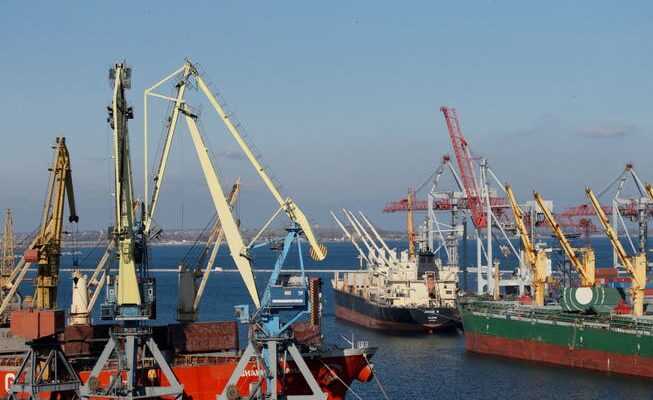Renowned economists have drawn up a plan of what will be important in the reconstruction of Ukraine. Unfortunately, they reckoned without the politicians. There is also the «Versailles question».
Traditionally, Ukraine exported much of its produce through the Black Sea port of Odessa, but this is now blocked.
Although there is no end in sight to the Ukraine war, economists are already thinking about what the country’s post-war economy might look like. Ukraine is currently suffering enormous economic damage, which is difficult to quantify because it becomes more serious with each additional day of war. The Center for Economic Policy Research (CEPR), a network of 1,600 researching economists, estimates that the Russian army has damaged or destroyed 30 to 60 percent of Ukrainian production capacities.
Tax Russian oil
At least the administration still functions to some extent – at least in places where the Russian army is not raging. “But we need liquidity,” said Timofei Milovanov of the Kyiv School of Economics at a CEPR video conference. In order to pay wages and social benefits, the government needs a single-digit billion amount every month.
Financially, however, it is increasingly getting into a tight spot because the companies can hardly export any more goods, for example. Traditionally, Ukraine exported much of its produce through the Black Sea ports, but these are now blocked (Odessa) or destroyed (Mariupol).
Depending on how long the war lasts, Ukraine’s reconstruction will cost hundreds of billions of dollars. According to the ideas of the CEPR, various sources should be tapped for this. The economists propose, for example, that the EU tax Russian energy exports and make this money available to Ukraine.
Partially expropriate Russia
A similar model has been used before. In 1991, an international military alliance drove the Iraqi army out of Kuwait. Part of Iraq’s oil revenues flowed into a fund to finance the reconstruction of the emirate.
The economists also recommend channeling Russian financial assets, which have been frozen by Western countries, into Ukraine’s infrastructure. According to the scientists, this could be money from the Russian state or the assets of oligarchs.
According to the economists, a special agency will oversee the reconstruction of Ukraine. This is to prevent duplication and corruption. Both are realistic dangers. For example, the reconstruction program after the third Gulf War in 2003 was poorly coordinated, and Ukrainian officials are notorious for corruptibility. During the discussion, however, the economist Milovanov emphasized that such an agency must be owned by Ukraine.
EU accession as an incentive and motivation
At the same time, it should be in some way close to the EU for two reasons: First, the World Bank or the International Monetary Fund (IMF) are hardly likely to be close partners. “Certain member countries are not friendly to Ukraine,” Harvard economist Kenneth Rogoff said diplomatically in the discussion. In concrete terms, this means that Russia is a shareholder in the World Bank and will hardly cooperate.
Secondly, the agency’s proximity to the EU gives Ukraine the prospect of one day being able to join the union of states. This in turn provides an incentive for the country to reform the judiciary and administration in line with Western standards.
In the end, all economists agreed that Ukraine should primarily receive grants and not loans. “Loans are not financially sustainable for Ukraine,” said Swiss economist Beatrice Weder di Mauro.
Who Makes Peace?
As coherent as the economists’ proposals sound in theory, one problem remains: war is still raging in Ukraine, and nobody knows what a peace order with Russian President Vladimir Putin and his entourage could look like. “What regime will we be dealing with in Russia?” asked Torbjörn Becker of the Stockholm School of Economics.
Unlike in 1918 after the end of the First World War, the question of guilt will not arise. At that time, in the peace negotiations at Versailles, the Allies blamed the German Empire for the war, which led to many Germans rejecting the peace order. In this respect, the situation today is clear: Russia triggered the Ukraine war with its attacks in 2014 and February 2022. However, another «Versailles» problem arises. After the First World War, Germany had to pay high reparations, which repeatedly pushed the country into financial difficulties and undermined the transition to democracy.
The CEPR economists seem to consider this risk to be low in the case of Russia. Sergei Guriev of Sciences Po University in Paris said Russia is a big country and therefore able to pay some of the frozen funds as reparations.
The Ukraine as an ecological model state
However, the question remains as to how quickly such transfers can be made. Court decisions and laws were needed to expropriate the oligarchs, for example.
And the economists’ program is ambitious in another respect: They don’t just want to rebuild Ukraine, they also want to transform it into an ecological and technological model state. Instead of primarily using fossil fuels as before, Ukraine should set itself the goal of decarbonizing the economy. Maybe that’s a bit of a big ambition.
